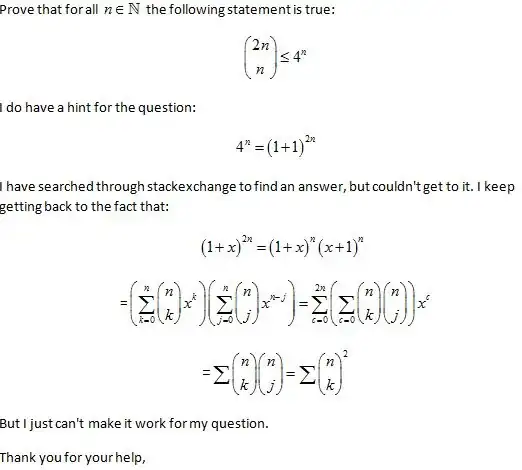In my assignment I have the following question:

Alan
In my assignment I have the following question:

Alan
Use a more straight-forward approach: $$4^n = (1+1)^{2n} = \sum_{i=0}^{2n} \binom{2n}i 1^i 1^{2n-i} = \sum_{i=0}^{2n} \binom{2n}i$$ Now since binomial coefficients are nonnegative, we get $$4^n \ge \binom{2n}i \qquad \forall 0\le i\le 2n$$ Especially for $i=n$.
In this answer, a simple argument shows that $$ \binom{2n}{n}\frac{\sqrt{n+\frac13}}{4^n} $$ is decreasing. Therefore, for any $n\ge0$, we have $$ \binom{2n}{n}\le\frac{4^n}{\sqrt{3n+1}} $$
Alan.Here is my suggestion.
consider $(1+x)^{2n}$, then the coefficient of $x^n$ is $\binom{2n}{n}$.
we notice $(1+x)^{2n}$=$\sum_{i=0}^{2n}\binom{2n}{i}x^i$,and $\binom{2n}{i}\geq 1$.
So if we let x=1, then we have $\binom{2n}{n}\leq\sum_{i=0}^{2n}\binom{2n}{i}1^i=\sum_{i=0}^{2n}\binom{2n}{i}$.
and when x=1,$\sum_{i=0}^{2n}\binom{2n}{i}=(1+1)^{2n}=2^{2n}=4^n$.
Finally, we have $\binom{2n}{n} \leq 4^n$.